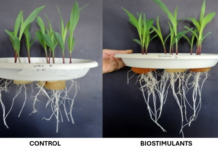Delayed distribution of fertilizer inputs to deserving smallholder farmers during the just ended season was an administrative initiative to curb corruption but helped to save US155 million and ensure the commodity reached the intended end-users, says Zambia’s President Hakainde Hichilema.
There has been concerns over the delays in the acquisition of the fertilizer and other farming inputs for the 2022/23 farming season, with some farmers not yet accessing the inputs. Some players fear the crop output might be affected, chiefly on maize and other cash crops, a development the Government has regretted.
Addressing journalists in Lusaka, late Tuesday, President Hichilema, while acknowledging the anticipated effects and inconveniences caused to recipients, says it was a worthwhile ‘wait’ as it helped cleanse the procurement system of underhand methods during the 2022/23 season.
He assured of an expeditious procurement system of inputs in the aftermath has however assured the country that in 2023, there will be improved and early procurement of farming inputs to be undertaken locally.
The revised procurement process will be supported by the establishment of more local fertilizer manufacturing companies. This will help sustain the monitoring of underhand methods and ensure all inputs and needs of the farmers are not delayed now and for the future.
Among other players concerned with the delays were traditional leaders fearing it was a risk to the output of food in the country, according to Senior Chief Nkula of Northern Zambia, who heads traditional leaders in the house of representatives.
He appealed to the Government to share concerns and challenges being faced when handling such matters relating to food production to avert hunger when production is affected.
“It is a worrisome situation to us the royal highnesses and also the farmers across the country. Because farmers are now failing to plan what they will plant, when and how. In the absence of farming inputs, there will be no production at all, and also extreme delay in delivery of farming inputs will result in low production”
Earlier agriculture minister Reuben Mtolo Phiri acknowledged the delayed distribution of the inputs and its subsequent effect on the farming system for the deserving 1 million smallholder farmers but assured of the Government’s resolve to clean up the system and avert future challenges.
On September 7 this year, agriculture minister Mtolo Phiri assured the nation that fertiliser distribution would start at the beginning of October, but by the end of October distribution had still not started in earnest.
Some farmers despite remitting the K400 as a pre-requisite to access the inputs are still lamenting the delayed access. Some players forecast a reduced maize output next season because of the bureaucracy coupled with delayed rainfall.
However, some opposition political players have criticized the ‘slow process but call for broadened fertilizer distribution process while asking the Government to find an option for Urea as a top dresser and D-Compound as the basal dresser.
“These are not the only good options available. There are other fertilisers that can be used as efficiently and effectively as these, or even better.” Socialist party leader Fred Mmembe argued in his statement accessed by FRA
Agriculture is the major source of livelihood for the great majority of our people – 54.8% of our workforce is deployed in agriculture. It cannot, he argued, be run in such a cavalier way, premised on personal basis and patronage, he further contended.
He claimed the Government was devising a ploy to create a food shortage and allow imports, a drain on the meagre resources, an argument dispelled by the Presidency and the ruling UPND which attributes to climatic changes.








